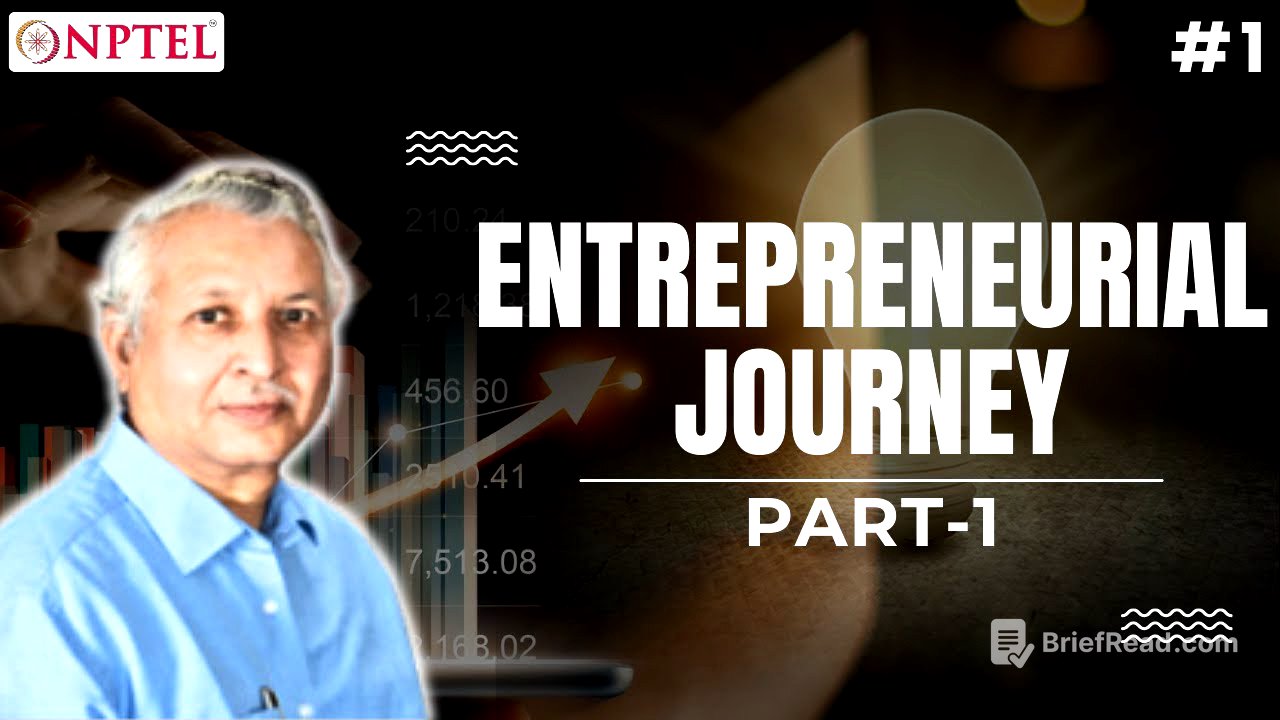TLDR;
This lecture introduces the NPTEL course on entrepreneurship, highlighting its importance for economic development. It outlines the course structure, which includes 15 modules covering various aspects of the entrepreneurial journey, from ideation to scaling and beyond. The lecture also differentiates between various types of entrepreneurs and firms, and discusses government initiatives supporting entrepreneurship in India.
- The course provides a detailed overview of entrepreneurship, its importance for economic growth, and insights based on real-life case studies.
- It will be delivered over 12 weeks, comprising 15 modules, illustrative examples, and 12 case studies.
- Entrepreneurship is crucial for economic development, boosting growth through innovation, competition, and job creation.
Course Introduction and Professor's Background [0:05]
Professor C. Bhaktavatsala Rao welcomes participants to the NPTEL course on entrepreneurship, emphasizing its critical role in economic development. He shares his background as an IIT Madras alumnus with a M.Tech and PhD, along with 44 years of industrial experience in multinational corporations, including a role as Managing Director and Executive Chairman at Hospita Healthcare India Private Limited (a Pfizer company). He also mentions his passion for writing, research, and teaching, leading to the establishment of LeaderCrest academy and his current position as Dr. Ajit Singhvi Chair Professor in Management Studies at IIT Madras.
Course Objectives and Delivery [1:58]
The course aims to provide a detailed overview of entrepreneurship, highlighting its importance for industrial and business growth. It will offer insights based on real-life case examples and apply theoretical concepts in a practical, multidisciplinary framework. The course will also provide constructs for entrepreneurs to achieve sustainable growth. The course will be delivered as per the NPTEL format, with each module focusing on a core theme and multiple topics. It will include illustrative and experiential examples and wrap up with 12 case studies of entrepreneurial developments, each with a different strategy and business model.
Course Structure: 15 Modules Overview [3:11]
The course comprises 15 modules offered over 12 weeks. These modules cover topics such as the entrepreneurial journey, discovering the entrepreneurial spark, ideation and prototyping, testing and commercialization, and disruption as a success driver. Further modules explore technological innovation, raising finances, the relationship between education and entrepreneurship, and transitioning beyond founders. The course also addresses India as a start-up nation, national entrepreneurial culture, entrepreneur thermodynamics, entrepreneurship and employment, and concludes with case studies of 12 companies.
Expected Course Outcomes [9:15]
Upon completing the course, participants should gain a deep understanding of entrepreneurship and its role in the economy. They should be able to approach entrepreneurship with clarity and focus, understanding both the opportunities and risks involved. Practicing entrepreneurs will benefit from additional insights to navigate the challenges and opportunities more effectively.
Importance of Entrepreneurship [10:04]
Entrepreneurship is an essential driver of economic development, fostering continuous growth, productivity, safety, and environmental protection. It involves the continuous renewal of technologies and business methods. An entrepreneurial culture, supported by progressive government policies, is fundamental for enhancing entrepreneurship. Entrepreneurship boosts economic growth by introducing innovative technologies, products, and services. Increased competition from entrepreneurs motivates established companies to improve, benefiting the economy through newer offerings. Entrepreneurs also provide new job opportunities in both the short and long term, raising the productivity of firms and economies.
Types of Entrepreneurs [13:50]
There are four main types of entrepreneurs: Innovative, Replicative, Opportunity, and Necessity. Innovative entrepreneurs introduce new products or services, creating new business segments (e.g., Google with search engines). Replicative entrepreneurs offer similar products or services but with a unique selling proposition, making innovation accessible to a broader society. Opportunity entrepreneurs are driven by the desire for wealth creation and serving the nation, while Necessity entrepreneurs are forced by circumstances like job loss to start their own ventures. Social entrepreneurs focus on making a social impact, such as providing clean water or nutritious food, often without a primary economic profit motive.
Origin and Challenges of Entrepreneurship [20:02]
Entrepreneurship involves planning, launching, and running a new business with the motive of earning profit and creating wealth. Every firm, regardless of size, starts as an entrepreneurial initiative. The entrepreneurial journey requires the right product or service at the right time and in the right manner. Challenges include ensuring the product meets market needs, as entrepreneurial companies often lack the deep pockets of established firms. Successful entrepreneurial ventures expand existing markets or create new ones.
Entrepreneurial Firms vs. Start-up Firms [23:46]
Entrepreneurial firms and start-up firms share similar characteristics but differ in key aspects. Both take risks, but entrepreneurial firms tend to be more replicative and not always based on new technology. Start-up firms, on the other hand, are typically based on new technologies and aim to create new businesses. For example, setting up a retirement home could be an innovative entrepreneurial venture, while treating patients through personalized genetic medicine represents a technology-driven start-up. Both types of firms face hurdles like limited resources and talent.
Entrepreneurship in India: MSMEs and Start-ups [27:54]
India has a strong history of entrepreneurship, evident in its micro, small, and medium enterprises (MSMEs). The Indian government supports MSMEs through various benefits, including tax benefits, subsidies, and intellectual property support. MSMEs are classified based on investment in plant and machinery (for product-based enterprises) or equipment (for service-based enterprises). Start-ups, defined as entities working towards innovation and wealth creation, also receive targeted tax benefits. Government initiatives like Start-up India, Stand Up India, and Make in India aim to foster technology-led design and manufacturing, meeting both Indian and global market needs. A start-up is defined as a Private Limited company, Partnership firm or Limited Liability Partnership for a period of 10 years from the date of its incorporation with turnover not exceeding rupees 100 crore.








